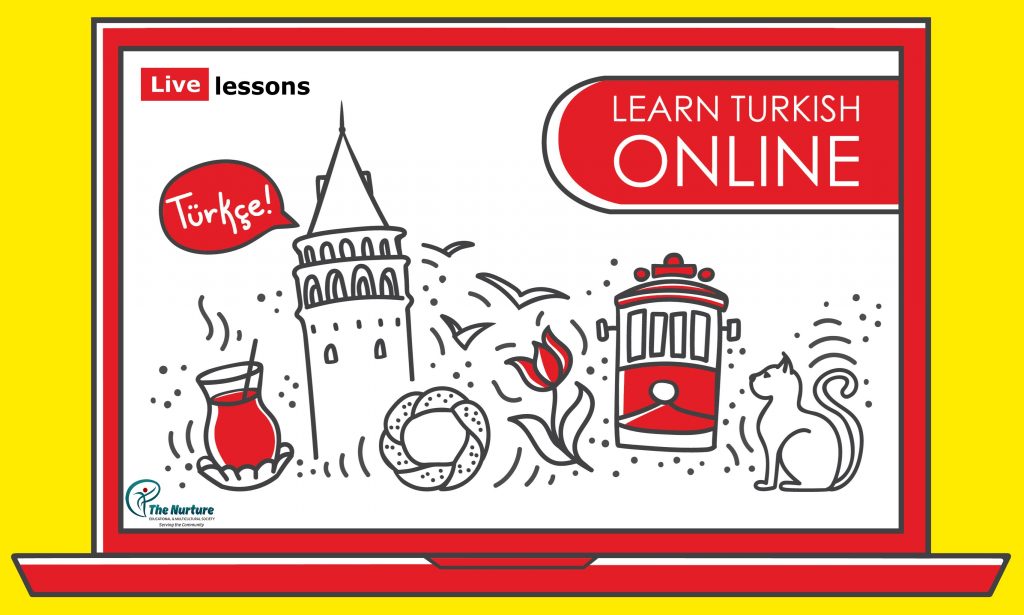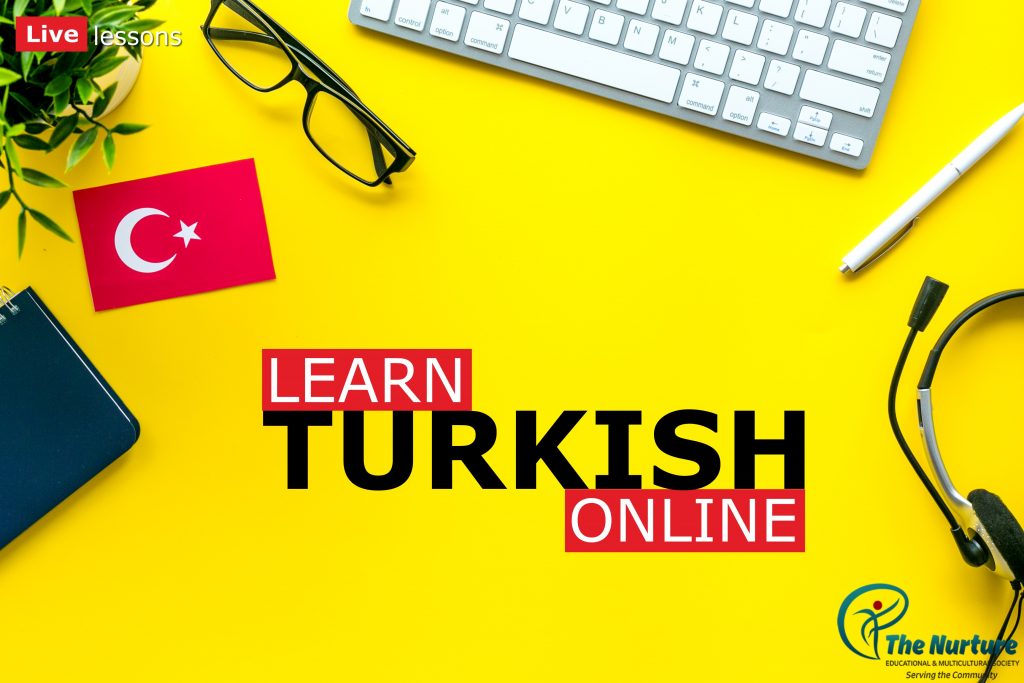

The Nurture Education Course Outlines (Online) provide a learning framework for the Nurture Foreign Language Courses.
They are designed to provide you with a good idea of what you might cover over a 10-week period, and include typical themes, grammar and vocabulary fields. They are flexible rather than prescriptive, in that our teachers may decide to adapt their learning plans to the specific level, aims and interests of their classes. Use the tabs below to view the relevant Turkish course outline for your level.


Levels
Topics & Vocabulary
Grammar
Cultural Content
Skills Work
Beginner 1
• Introducing yourself : greetings – saying “Hello”, “Goodbye” and “How are you?”;
• The Turkish alphabet
• Numbers: 10-100
• Basic colours
• Spelling names
• Basic phrases in daily life situations
• Question words
• Titles: Mr, Mrs, Ms
• Offering & ordering drinks and snacks at a bar or café, Eating out, ordering meals at a restaurant, asking for the bill
• Enquiring what dishes there are at a restaurant and what’s in them
• Talking about professions and making profession names using suffixes “cı / ci / cu / cü”
• Asking what something means
• Introducing the main characteristics of Turkish
• “Bir” as the indefinite article
• “Değil” means “Not”
• Question tag “değil mi?”
• Verbless sentences (“be”)
• Personal and demonstrative pronouns
• Personal endings in the present tense
• “There is/are…” / “There is/are not…”
• The plural suffix “–ler / -lar”
• Numbers: 100s and 1000s
• Five cases of a noun
• Question forms
• The plural suffix
• Word order
• The negative suffix –ma / –me
• Talking about yourself
• Making country, nationality and language names using suffixes
• The language family that Turkish belongs to
• The relationship between Turkish, European and Middle Eastern languages
• Titles – Mr, Mrs; addressing others in appropriate ways
• Difference between singular and plural “you”
• Greetings
• Turkish snacks and drinks
• Turkish food and drinks
• Reading signs
• Place names in Istanbul
• Map of Turkey
• Speaking activities: Using classroom conversation regularly
• Simple chats about the weather
• Listening activities
• Writing practice: Describing pictures, finding differences between pictures, etc.
• Basic rules of pronunciation
• Pronunciation of the letters in the alphabet
Beginner 2
• Enquiring about accommodation in person and over the phone
• Asking about facilities when booking an accommodation
• Filling in forms
• Asking for addresses and giving directions
• Giving instructions
• Getting around a new place
• Asking other people about themselves
• Talking about your country, nationality and language
• Saying what you have got
• Introducing one’s family
• Explaining the reasons using “because”
• Major and minor vowel harmony
• Personal and demonstrative pronouns
• Personal endings in the present tense
• The main case suffixes: locative, dative, ablative and accusative
• Consonant changes (hardening and softening)
• Verb stems, the infinitive and the imperative
• The negative suffix
• Present continuous tense in positive, negative and question forms
• Harmonizer y
• Direct and indirect object pronouns
• Comparisons
• Making adjectives using suffixes “-lı / -li and -sız / -siz”
• The present tense in verbless sentences
• Introduction to possessive pronouns
• The negative form of verbless sentences
• Asking questions in verbless sentences
• Layout of Ataturk Airport – Istanbul
• Shopping culture in Turkey
• Presents to buy from Turkey
• Holiday places in Turkey
• Family relations and relatives in Turkish culture
• Speaking activities: Using classroom conversation regularly
• Simple chats about food and places
• Listening activities
• Writing practice: Describing pictures, finding differences between pictures, etc.
• Basic rules of pronunciation
• Shopping themed role plays
• Haggling
Beginner 3
• Talking about the weather
• Comparing months and seasons
• Talking about likes and dislikes
• Shopping for presents and clothes
• Asking prices, sizes and colour
• Talking about the past
• Writing postcards
• Having a social chat
• Talking about good and bad experiences
• Using telling-the-time skills talking about the past
• Use of ever / never (hiç) in the past tense
• Time words in the past tense
• Talking about what you have
• Building simple compound nouns
• “Let’s…” and “Shall we…?” forms
• Narrowing and softening
• Past tense in positive, negative and interrogative forms
• Consonant change in the past tense
• Minor vowel harmony in the past tense
• Past tense in “be” phrases
• Learning some daily conversation phrases that are used in the past tense
• More possessives, possessive pronouns
• Possessor and possessed suffix
• Noun phrases
• Buffer consonants “s” and “n”
• The use of “for”
• Object and verb agreement
• Special days and public holidays
• Common forms of public transport in Turkey
• Employment in Turkey
• Atatürk, the founder of the modern Turkey
• Cooking Turkish food and making Turkish coffee
• Filling in online reservation forms
• Speaking activities: Using games (e.g. Puzzles, Guess who? Crosswords, etc.)
• Writing practice: Writing about your holidays, writing postcards
• Giving presentations and asking questions
• Talking about yourself and answering questions about yourself
• Taking notes when listening
• Pronunciation
Elementary 1
• Revision: Exchanging greetings and farewells
• Revision: Basic phrases
• Asking goods in shops
• Asking simple questions and making simple statements
• More about nationalities and languages
• Making basic dialogues
• Adjectives
• Questions
• Addressing people: Bey / Hanım
• Talking about yourself and your profession in detail
• Vocabulary building: Adjectives.
• Importance of suffixes when making adjectives
• Turning a statement into a question: mi? mu? mı or mü?
• Making a question negative
• “There is”, “there are” “are there?” “is there?”
• The verb “to be”
• Personal pronouns
• Keeping vowels apart
• Talking about yourself using appropriate personal endings
• Revising the importance of buffer “y”
• Past tense verb forms
• Practicing some daily conversation phrases that are used in the past tense
• Titles – Mr, Mrs; addressing others in appropriate ways
• Talking about yourself in detail
• Shopping
• Turkish food and drinks
• Speaking activities: Talk about yourself
• Simple chats: Getting to know each other
• Listening activities
• Writing practice: Writing about yourself
• Drilling: Improving pronunciation
Elementary 2
• Describing people and objects and the actions they are doing
• Commands: Telling someone what to do/ what not to do
• Ordering a meal with your friends
• Revision: Five cases of a noun
• Introducing a friend
• Directions: Reading signs
• Saying what is happening and what will happen shortly
• Addressing people: Abi / Abla
• Telling what belongs to whom
• Saying what you have and what you want
• Object and verb agreement
• The word order
• Making negative with “–me/-ma” when giving commands
• The main case suffixes: locative, dative, ablative and accusative
• Revision: Present Continuous Tense
• Possessives
• The possessor ending “-in” and possessed ending “–i” or “–si”
• Revising the importance of buffer “s”
• Suffix “–ci, çi”
• Avoiding vowel clashes
• Addressing people
• Reading signs
• Turkish food and drinks
• Some city names in Turkey
• Speaking activities: Practice five cases of the noun
• Speaking activities: Introduce your friend to a group of friends
• Listening activities
• Writing practice: Practice five cases of a noun (e.g. Talk about your holidays)
Elementary 3
• Talking about the past, telling what has happened
• Talking about the present and future
• Diaries, talking about regular occurrences and habits, describing unchanging facts
• Making suggestions
• Informal suggestions -sana / -sene
• “With / by” preposition (the instrumental) in both word and suffix forms
• Prepositions of place “on, under, inside etc.”
• More about telling the time (minutes past etc.)
• Saying where things are in relation to each other
• Describing one’s home
• Asking for help
• Expressing requests and making offers
• Stating intentions and willingness
• Telling stories and jokes
Grammar:
• Revising the previous level’s grammar
• The future tense in all forms
• Future tense of verbless “to be”
• Time words for future tense
• The pronunciation of the future tense
• The present tense in all forms
• -erek / -arak : “by … doing”
• The present tense of verbless “to be”
• Time words for present tense
• Formal “is”: “-dır/dir” suffix
• Jokes from Nasrettin Hoca, the famous Turkish scholar
• Differences and similarities between Ottoman and Turkish socio-cultural life
• Results of the language revolution in modern Turkey
• The role of the Turkish Language Association in “Turkification” of the language
• Telling a joke in Turkish from one’s own country
• Listening activity: Dialogues and songs
• Reading simplified essays
• Discussion in pairs and groups
• Pronunciation
Intermediate 1
• Talking about hope or possibility
• “I wonder”
• Common exclamations
• Expressing possibility
• Giving advice, making suggestions, and proposing solutions to problems
• Offering to do something
• Comparing things
• Talking about abilities and skills
• Stating uncertainty
• Expressing requests
• Making plans
• Describing objects in regards to their place
• Expressing one’s opinion and asking for clarifications
• Talking about likes and dislikes
• Expressing obligations: Lazim, gerek, mecbur.
• Revising the previous level’s grammar
• Relative clause: present participle -an / -en”
• “-lik” ending
• Expressing “as”
• Object and verb agreement
• Can / can’t
• Might / might not
• Bufer consonants “y”, “n” and “s”
• -ki (the one in/on/at) ending
• Infinitives as nouns
• Giving advice, saying what will happen if something else happens
• Should, must, have to
• Use of set phrases in Turkish Immigrants and ethnic groups living in Turkey Socio-cultural life in different parts of Turkey Leisure activities in different regions Climate in Turkey
• Lots of speaking: Situational exercises
• Reading adverts for booking holidays
• Listening activities: Film fragments and dialects from different regions
• Writing a short statement describing one’s skills and abilities
Intermediate 2
• Making official announcements
• Making sentences using relative clauses
• Saying what will happen if something else happens, giving advice
• Talking about how you feel
• Describing an illness to a doctor or pharmacist
• Saying how long something has been going on
• Shopping at a pharmacy
• Expressing needs
• Parts of the body
• Lifestyle supplements of Turkish newspapers
• Complaining about places
• Reporting what has happened
• Gossiping
• Telling jokes using “-miş” past tense
• Talking about options using “both”, “either”, “neither”
• Reporting what someone else has said
• Saying what you expect to have happened
• “If” clauses
• Using simple present tense in conditional sentences
• Expressing one’s needs
• “Since” and “for”
• “Until”
• Reported past tense “-miş”
• “Both”, “either”, “neither”
• “-miştir” : Journalistic past tense
• Building time phrases using “before, after and when”
• Using “which” and “that”
• The word Allah in Turkish set phrases
• Loan words from other cultures
• Turkish journalism and online media
• Festivals in Istanbul – Researching “What to do this summer in Istanbul”
• Politic life in Turkey and the process of becoming a member of the EU
• Listening to extracts from news and reading newspapers
• Telling what has happened using the -miş tense
• Writing a comment on a newspaper article
• Listening activities -listening to a speech on the radio about current relations
Intermediate 3
• Revision of previous subjects
• Describing the time of actions in relation to other events
• Describing objects
• Making adjectives stronger
• Giving and understanding recipes
• Talking about “what was happening?”
• Talking about changes in your life “When I was…”
• Giving instructions
• Talking about films recently seen
• Expressing opinions about hot topics in the media
• Talking about the sense of humour of different cultures
• Revision: Choice of grammar topics primarily according to students’ needs
• Forming time expressions from verb endings “-ince, -ken, -den önce, -den sonra, -madan önce, -dikten sonra”
• Suffixes: “-ip” and “-meden” verb endings
• Relative clauses: -dık / -dik, -acak / -ecek (past and future participles)
• Adjectives reinforcement
• Turkish cinema
• Turkish cuisine
• Concept of Bayram – comparing the modern and old festive season
• Traditions and modern way of life in Turkey
• Introducing literature works from famous Turkish authors
• The Turkish sense of humour
• Reading caricatures, literature pieces and articles from popular blogs and columnists
• Speaking activities
• Writing practice – e.g. film and book reviews and comments
• Listening activities – e.g. radio, TV and films
• Advanced pronunciation
Upper Intermediate
• Revision: Choice of grammar topics primarily according to students’ needs
• Expressing surprise
• Saying what used to happen
• Talking about having things done
• Saying when, where and how something happened
• Saying what was done and by whom
• Saying what was going to happen
• Building new vocabulary using specific word endings
• Saying what you would do in an unlikely situation
• Saying what you would have done if things had been different
• Expressing regret
• Vocabulary building: Using specific word endings
• The Passive Voice
• Saying “by” in passive sentences
• Time expressions: Artik, daha, hemen, henuz, her zaman, etc.
• Showing surprise: Ki!
• Reflexives: Myself, yourself, etc.
• Vocabulary building: -im, -in, -gi, -gin, -gen.
• Second and third conditionals
• Past conditionals
• “as soon as”
• Using the Passive in signs
• Some cities in Turkey
• Reading signs
• Holidays in Turkey
• Reading activity: Reading information about a city. How to go there? Where to stay? etc.
• Speaking & Listening activities: Talk about your holidays. Express likes and dislikes.
• Talking about past habits
Advanced
At this level, students should be doing plenty of speaking practice.
Conversations based on daily life situations are essential. It could be pair work or group work dialogues; using appropriate props & materials in the classroom. Taking students out to put the dialogues they have learnt into practice is another useful practice for tactile learning.
These could include outing events such as ordering food at a restaurant or shopping at a Turkish supermarket.
At this level, Grammar should be covered and revised according to the students’ needs. Therefore, assessment tests and progress tests are very good to check on their needs during this level.
Proficiency
At this level, students should be doing plenty of speaking practice based on daily life situations as well as serious discussions about a specific topic. It could be pair work or group work dialogues; using appropriate props and materialds in the classroom. Taking students out to put the dialogues they have learnt into practice is another useful practice for tactile learning. These could include outing events such as ordering food at a restaurant, cinema days (e.g. Turkish Film Festival) and theatre plays.
At this level, Grammar should be covered and revised according to the students’ needs. Therefore, assessment tests and progress tests are very good to check on their needs during this level.


